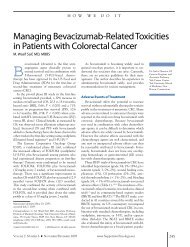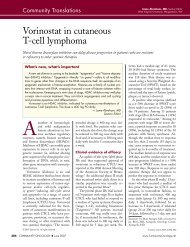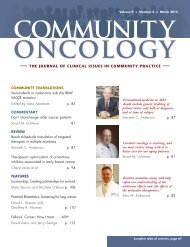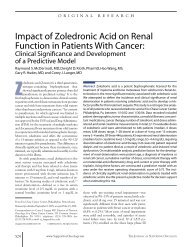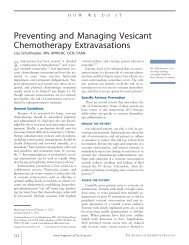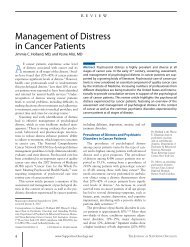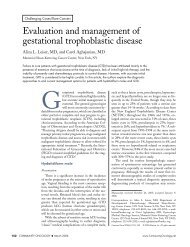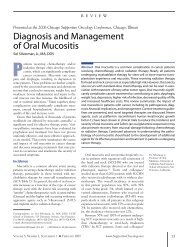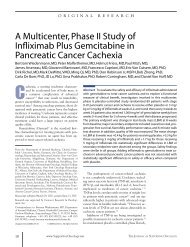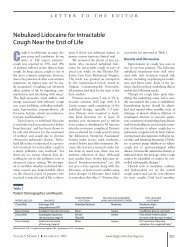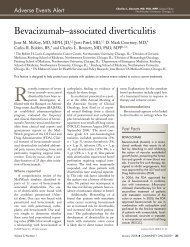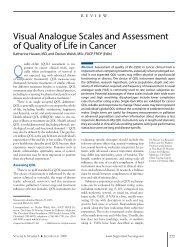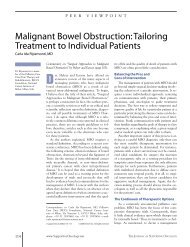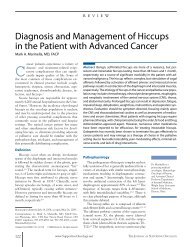Evaluating the “Good Death” Concept from Iranian Bereaved Family
Evaluating the “Good Death” Concept from Iranian Bereaved Family
Evaluating the “Good Death” Concept from Iranian Bereaved Family
Create successful ePaper yourself
Turn your PDF publications into a flip-book with our unique Google optimized e-Paper software.
Truthful Information<br />
<strong>the</strong>se preliminary findings, <strong>the</strong> piloted intervention is significant<br />
because it can lead to measurable impacts on knowledge about<br />
prognosis and appears to be judged helpful. We do not know <strong>the</strong><br />
impact of full and truthful information on patient knowledge,<br />
decision making, hope, attendant choices about advanced medical<br />
directives, chemo<strong>the</strong>rapy use, or hospice use. The next steps<br />
are to make <strong>the</strong> information available directly to patients on <strong>the</strong><br />
Internet, which is in progress. The purpose is not to increase or<br />
decrease <strong>the</strong> use of palliative chemo<strong>the</strong>rapy or hospice care; <strong>the</strong><br />
lack of research into <strong>the</strong> decisions fully informed patients make<br />
precludes any such prediction. Since <strong>the</strong> intervention appears to<br />
be successful in this pilot trial, it will be tested in conjunction<br />
with standard care in a randomized clinical trial with measurement<br />
of quality of care, quality of life, and health-care cost<br />
outcomes.<br />
Acknowledgments: This research was supported by VCU<br />
School of Medicine Research Year Out, GO8 LM0095259<br />
<strong>from</strong> <strong>the</strong> National Library of Medicine (T. J. S., L. L., J. K.),<br />
and R01CA116227-01 (T. J. S.) <strong>from</strong> <strong>the</strong> National Cancer<br />
Institute.<br />
Appendix A<br />
Decision Aids<br />
Patient Name: ___<br />
Date: ___/___/___<br />
Lung Cancer Second Line Chemo<strong>the</strong>rapy<br />
What is my chance of being alive at one year if I take<br />
chemo<strong>the</strong>rapy, or do best supportive care such as hospice?<br />
Chemo<strong>the</strong>rapy with a drug like docetaxel (Taxotere®) or<br />
pemetrexed (Alimta®) improves <strong>the</strong> chance of being alive at<br />
one year by 18 out of 100 people. With chemo<strong>the</strong>rapy, 37 of<br />
100 people were alive at one year. Without chemo<strong>the</strong>rapy, 11<br />
of 100 were alive.<br />
Patients receiving docetaxel (Taxotere®) chemo<strong>the</strong>rapy lived<br />
an average of 7.5 months, versus 4.6 months if <strong>the</strong>y did not take<br />
chemo<strong>the</strong>rapy. In o<strong>the</strong>r words, <strong>the</strong>y lived 2 to 3 months longer.<br />
If you are having cancer-related symptoms that limit your<br />
daily activities, <strong>the</strong> chances of being alive at one year are less<br />
than that described above.<br />
The numbers given here are what happens to <strong>the</strong> average<br />
person with this disease in this situation. Half <strong>the</strong> patients<br />
will do better than this, and half will do worse. Your<br />
situation could be better or worse. The numbers given for<br />
<strong>the</strong> chance of cure are very accurate. The numbers are<br />
given to help you with your own decision making.<br />
What is <strong>the</strong> chance of my cancer shrinking by half?<br />
About 6 of 100 people will have <strong>the</strong>ir cancer shrink by half.<br />
If you are having cancer-related symptoms that limit your<br />
daily activities, <strong>the</strong> chances are less than that described<br />
above.<br />
Chemo<strong>the</strong>rapy<br />
No<br />
chemo<strong>the</strong>rapy<br />
0% 20% 40% 60% 80% 100%<br />
Chance of being alive at one year<br />
Alive at 1 year<br />
Dead at 1 year<br />
What is <strong>the</strong> chance of my being cured by chemo<strong>the</strong>rapy?<br />
In this setting, <strong>the</strong>re is no chance of cure. The goal may<br />
change to controlling <strong>the</strong> disease and any symptoms for as<br />
long as possible. You may want to talk with your doctor about<br />
your own chances and goals of <strong>the</strong>rapy.<br />
How long will chemo<strong>the</strong>rapy make my cancer shrink, if it does?<br />
For all patients who did not get chemo<strong>the</strong>rapy, <strong>the</strong> average time<br />
before <strong>the</strong> cancer grew was 7 weeks. For patients who got chemo<strong>the</strong>rapy,<br />
<strong>the</strong> average time before <strong>the</strong> cancer grew was 11 weeks.<br />
What did chemo<strong>the</strong>rapy do to quality of life?<br />
Chemo<strong>the</strong>rapy helped reduce pain scores and did not make<br />
quality of life worse.<br />
What are <strong>the</strong> most common side effects?<br />
The most common side effects will vary with <strong>the</strong> type of treatment<br />
given.<br />
Some of <strong>the</strong> most common ones include <strong>the</strong> following:<br />
Mucositis (mouth sores).<br />
Nausea/vomiting; usually controllable.<br />
Alopecia (hair loss).<br />
Neutropenia (low white blood cell count) and infection requiring<br />
antibiotics.<br />
Neuropathy (numbness and pain in <strong>the</strong> hands and feet).<br />
Are <strong>the</strong>re o<strong>the</strong>r issues that I should address at this time?<br />
Many people use this time to address a life review–what <strong>the</strong>y have<br />
learned during life that <strong>the</strong>y want to share with <strong>the</strong>ir families, and<br />
planning for events in <strong>the</strong> future like birthdays or weddings).<br />
Some people address spiritual issues.<br />
Some people address financial issues like a will.<br />
Some people address Advance Directives (Living Wills).<br />
For instance, if you could not speak for yourself, who would<br />
you want to make decisions about your care?<br />
If your heart stopped beating, or you stopped breathing, due to<br />
<strong>the</strong> cancer worsening, would you want to have resuscitation<br />
(CPR), or be allowed to die naturally without resuscitation?<br />
Some people use this time to discuss with <strong>the</strong>ir loved ones<br />
how <strong>the</strong>y would like to spend <strong>the</strong> rest of <strong>the</strong>ir life. For<br />
instance, where do you want to spend your last days? Where<br />
do you want to die?<br />
Do you want to have hospice involved?<br />
These are all difficult issues, but important to discuss with<br />
your family and your health care professionals.<br />
84 www.SupportiveOncology.net THE JOURNAL OF SUPPORTIVE ONCOLOGY



